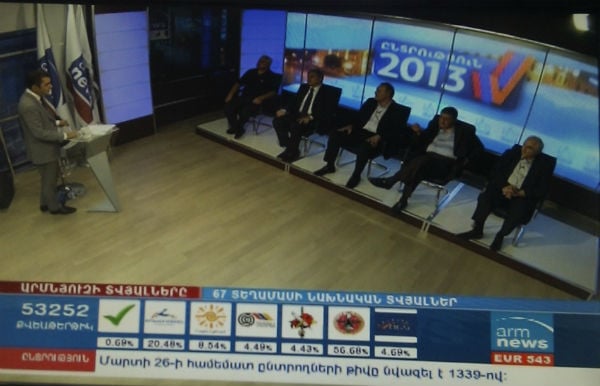A few hours after polling stations close is when the most interesting part of election periods begins: voting results appear on TV screens, are disseminated by news websites, and are discussed in social media.
The Central Electoral Commission’s interactive voting results “board” reflects the last few days, weeks, months, and years of political parties’ work. It is during this time that first impressions and assessments are valuable.
Rather unexpectedly, not all TV stations organized a special post-election program. Even Shant TV, which has a wealth of experience in presenting national election results quickly and visually, was pretty inactive this time around.
TV stations having a connection to political parties running in the election — Kentron TV (Prosperous Armenia Party) and Yerkir Media (Armenian Revolutionary Federation – Dashnaktsutyun) — had various levels of engagement.
Kentron TV continued to broadcast biting commentary on electoral violations, but the TV station’s main “star,” host and producer Petros Ghazaryan, chose not to have a post-election political talk.
Yerkir Media at night continued broadcasting news and discussed election day with various one-on-one interviews in the studio.
Armenia’s state broadcaster, H1, limited itself with one large news broadcast. Election results were on the screen for some time, then that last trace of election day also disappeared.
Only hours after Yerevan city council elections, ArmNews was presenting election results to TV viewers in record time.

The TV station’s 13 journalists, working in 13 precincts, were able to send preliminary voting results from electoral districts to the TV station faster than electoral commission members were able to send them to the Central Electoral Commission.
On ArmNews, the interactive image of votes counted exceeded the CEC’s similar results. The TV station had decided to “beat” the CEC. It had chosen speed and succeeded in the task.
It’s true, the 1–2% difference between the official and ArmNews’ results didn’t change the outcome. The “darlings” of the election were still the same.
ArmNews’ post-election, “marathon” broadcasting also included guests — musicians playing in the studio. In ArmNews’ case, this is becoming a tradition — artists were also singing and playing music during the last presidential and parliamentary elections as well.
Post-election “marathon” host Artak Aleksanyan was discussing the reasons behind voting results, politicians’ and parties’ strong and weak moves, and the questionable and tumultuary incidents on election day. Artak was a confident host, but sometimes this confidence threatened to become aggressive.

The questions were appropriate, but it appeared they were presented selectively. There were no political party representatives in the studio. Artak often posed accusatory pre-election and election day questions, and there simply was no one to respond to them. And the questions, which essentially were reproachful political analyses, were mainly aimed at the opposition. The Armenian National Congress (HAK), in particular.
If you’re going to rant about HAK’s last rally or HAK leader Levon Ter-Petrossian’s remarks about the Prosperous Armenia Party, why don’t you pay equal attention to the [ruling] Republican Party of Armenia (HHK)? If you’re discussing the election campaign period, couldn’t you also mention, say, the story about deceptively collecting “likes” on Facebook or the HHK attack on a journalist?
During this “marathon” reporting, electoral violations or the possible impact of such violations on the election outcome wasn’t discussed. And though the claim that there were voter bribes was floating around the studio, all the same, the celebratory post-election mood was unfazed.
One more thing I would like to see on TV when presenting election results: reports or live broadcasting from the campaign headquarters of political parties participating in the election. Initial reactions, the atmosphere in political campaign offices, and the whirlwind or the lack thereof are important for TV viewers.
Gegham Vardanyan







